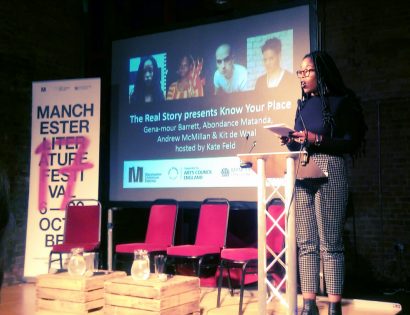 MLF Chapter & Verse
MLF Chapter & Verse
The Manchester Literature Festival Blog
Review: The Real Story presents Know Your Place
David Hartley reviews an evening of live essays on the working class experience presented by The Real Story and Dead Ink Books
The title of this event, and the book it launches, makes a clear demand of us: not to reflect on our place, not to consider it, but to know it. Taken literally, we are in Manchester, in an arts centre within an old mill, among wine-drinking literati and university students, as part of the Manchester Literature Festival, to launch a crowdfunded essay collection about the working class written by the working class, published by punky small-press Dead Ink Books, all supported by the Arts Council. And if that seems a dizzying and somewhat ironic blend of class politics, it perfectly suits the matter at hand.
As editor Nathan Connolly tells us in his opening reading, the definition of the so-called ‘working class’ may have stagnated in some heads as the whippet-and-flatcap-Road to Wigan Pier northerner, whereas the reality is much more fluid and complex. Connolly himself admits to a liking of avocados and Costa coffee and asks if the act of him setting up a publishing house automatically puts him into a middle class? Is his working class background thereby expunged and unimportant? Should working class people not aspire towards a university education and a life in writing? It is a brilliant opening gambit and the questions loom large over the rest of the event, as proud as a striking miner.
The book itself started life on Twitter. Following the Brexit vote, the result of which was partially blamed on the working class, author Nikesh Shukla tweeted that he would read the hell out of a collection of working class essays and Dead Ink were quick to leap up to say they would publish the hell out of it. Fast forward eighteen months, and the thing exists. It is a beautiful tome, with a smart beermat cover design and entries from across the worlds of writing; novelists, journalists, playwrights, and poets, all of whom take fierce pride in working class roots.
There are three further readings. Poet Andrew McMillan follows Connolly and grips the audience with his reflections on the conflations of sexual identity and class positioning. He gallantly undercuts any perceived notions that his time as a ‘young gay lad’ growing up in Barnsley was automatically one of hardship and homophobia. Instead he gives a nuanced and provocative account of how the cultural and media-driven performance of both homosexuality and working-classness complicated the definition of both areas. He offers increased plurality of representation as a possible answer. There’s no sense that the ‘working classes’ have a fixed idea of homosexuality, and nor, therefore, should culture.
Buzzfeed journalist Gena-mour Barrett (pictured) follows McMillan and gives a compelling and delightful account of the community of the housing estate of her youth, and her loss of that community when she moved into a comparatively sterile and isolating suburban London street. Spearing David Cameron’s declaration that housing estates are the main source of societal problems – particularly the riots of 2011 – Barrett celebrates an experience of the exact opposite. The noise and mayhem of the estate became her comfort and sound-tracked her richest and happiest years. Rather than holding her back, Barrett sees the estate as a key facet in the creation of the successful person she is today.
Rounding the readings off, novelist and working class champion Kit de Waal sounds a rallying cry to the publishing industry to come together and actively face up to the barriers imposed on aspiring working class writers. Using her own background as a case study, she links up the need for access to books, the desires of the working class to tell stories and the expense endeavoured in becoming a so-called ‘proper’ writer. Instead, she asks for the working classes to be ‘invited to the party’, to be talked with, recognised and actively encouraged. It is an energising and thrilling conclusion, full of both venom and hope in equal measure.
The book she reads from, Know Your Place, proves itself an important step forward in this quest. As the Q&A goes on to demonstrate, there has been a startling rise of late of independent small presses using innovative techniques, such as crowdfunding, to produce important books from sidelined voices. Know Your Place sits alongside Nikesh Shukla’s The Good Immigrant and Comma Press’s Protest: Stories of Resistance in a growing pantheon of vital anthologies, produced quickly and smartly before the big publishers could even blink.
And the result? The ‘literati’ (whatever that in fact may mean) gathering in a former mill to witness, consider and celebrate working class voices who challenge the very notion that a person has, or should know, a defined place in society. The ‘place’ of the title is the every-place, and it is time we all came to know it.
Know Your Place is published by Dead Ink Books and available right now. The launch event was presented by The Real Story, a Manchester-based organisation who champion creative non-fiction and the art of the essay. Follow all these folk: @DeadInkBooks and @RealStoryUK.
_
David Hartley is a writer and PhD candidate at the Centre for New Writing. Follow him on Twitter @DHartleyWriter
